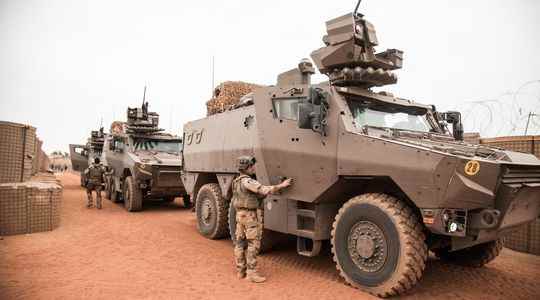Expulsion of the ambassador, demonstrations against the French presence… In Mali, an anti-French feeling is spreading through the population and its military aid in the country is no longer acclaimed at all as it was the case in 2013 , when François Hollande launched Operation Serval, transformed into Operation Barkhane the following year, to fight against the expansion of jihadist groups in the country. The more the months pass, the more the complete withdrawal of French forces in Mali seems inevitable.
Faced with a hostile junta which has just expelled its ambassador and demanded the departure of a Danish contingent recently deployed in Mali, Paris has given itself two weeks to decide with its European partners on the future of their military presence in this country.
The security threat has increased
Because after nine years of commitment on the ground, it is clear that the objective of fighting and eliminating the various terrorist groups in the region has not been met. The original idea was to be able to contain rebel and jihadist groups until the Malian army could take over. But the jihadist threat in the Sahel has not diminished, on the contrary, it has multiplied with today the presence of jihadist groups affiliated with Al-Qaeda (JNIM or GSIM, support group for Islam and Muslims) as well as the branches of the Islamic State in Africa: the Islamic State in the Greater Sahara (EIGS) and Islamic State in West Africa (Iswap).
Since the beginning of the launch of the French operation, differences have existed between Paris and Bamako. “France had as a priority the fight against jihadists while the Malian central government wanted above all to put an end to the old conflict with the Tuareg rebels, explains to France 24 Thierry Vircoulon, associate researcher at the Sub-Saharan Africa Center of the French Institute for International Relations (IFRI). Since then, these strategic differences have continued to grow. The conflicting landscape has shifted from north to center and has become much more complex. To the Tuareg problem and the jihadist threat have been added territorial wars but also linked to trafficking. France only fights on one front, jihadism, and as such necessarily has a limited impact on the global security context.
Moreover, with the coming to power of the military junta in 2021, relations have withered between Paris and Bamako. “The power opened the way to negotiations with the rebel groups, including the JNIM, explained to L’Express Elie Tenenbaum, this summer. So France can no longer fight against jihadism in such an open way”.
A lack of means put in place
Moreover, France has failed to put in place sufficient means to contain the threat. “We did not initially put the means to exert this famous pressure. Moreover, imagining that the Malian army was going to restructure and become a powerful force capable of resuming the fight on its own was completely illusory”, slice then Michel Goya , a former Army colonel and historian, interviewed by France 24.
Because if Operation Barkhane could be tactically effective, and “able to weaken, eliminate, and reduce the jihadist presence”, noted Elie Tenenbaum, military action is not enough. The “big black point” is the failure to “translate military successes into strategic and political effects on the ground, to fill the void” created by the elimination of enemy forces, and to reflect on the inclusion of minority populations such as the Tuaregs, the Fulani, the Arab-Berbers. As far as the local armies are concerned, “we have not been able to resolve the problems of human resource management, corruption, misappropriation of equipment…”, he adds.
On the side of the Elysée, this responsibility was rather Malian. “The State must return with its justice, its education, its police, everywhere, and in particular in Mali and Burkina, the projects must be developed, otherwise as soon as a territory is liberated, the terrorists take it back since there is no perspective. The French army does not have to replace the non-working Malian state”, considered Emmanuel Macron on October 5th.
The struggle in the Sahel is not over
The French withdrawal from Mali then seemed to impose itself as the only solution. Especially since the human and economic costs of this conflict are significant: 53 French soldiers have lost their lives on the spot, and the operation has a cost of almost one billion euros each year, says France 24 Michel Goya.
However, France will not leave the region. In partnership with the G5 Saleh (Chad, Mali, Burkina Faso, Niger and Mauritania), it continues to fight as violence has spread to neighboring Burkina Faso and Niger, as well as northern Côte d’Ivoire. , Benin and Ghana.
This is all the more urgent as the departure of European troops risks leaving a security vacuum in Mali favorable to groups affiliated with al-Qaeda and Islamic State (IS), as well as Wagner’s Russian mercenaries who, according to Westerners and despite Bamako’s denials, have been deployed in the country for several weeks. “The fight against terrorism will continue in the Sahel, with the agreement of the other countries in the region and in support of the countries of the Gulf of Guinea,” assured French Foreign Minister Jean-Yves Le Drian on Tuesday.
For more than six months, Paris has thus begun to reorganize its military system in Mali, leaving its three northernmost bases. Its numbers, of more than 5,000 soldiers in the Sahel last summer, have begun to decrease with the stated objective of keeping only 2,500 to 3,000 by 2023.
This transformation will now accelerate. Objective: to continue to support the local armies in the anti-jihadist fight but with a more discreet imprint, at a time when anti-French sentiment tends to grow in the sub-region.
